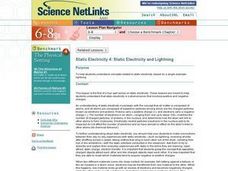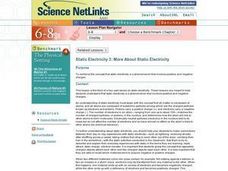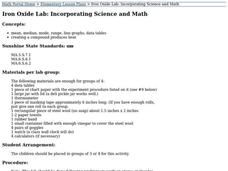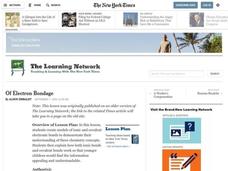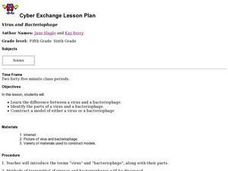Curated OER
Cooling With Sunshades
Students conduct research in order to find the effects of properties exposed to heat and how they change temperature. They consider the effect of sunlight upon objects that are placed outside with the help of an experiment. They also...
National Institute of Open Schooling
Mole Concept
Learners explore atomic measurement in the first activity in a series of 36. Through readings, activities, and questions, classes review standard SI units, learn about Avogadro's constant, and use it to help them calculate moles. They...
Curated OER
Gases and Plasmas
Students determine what plasma is and why the sun is made up of plasma. They recognize situations where plasmas are found in nature and made by man. They discuss why the sun is a huge ball of plasma and if there are different levels of...
Curated OER
Conservation of Mass
In this conservation of mass worksheet, students design an investigation to demonstrate the Law of Conservation of Mass. Students describe their investigation, collect data, graph the data and write a conclusion about what they discovered.
Curated OER
Frosty the Snowman Meets His Demise: An Analogy to Carbon Dating
Students read and discuss an article about carbon dating, then participate in a hands-on lab to discover how carbon dating works. Students also write a letter to a friend explaining the process, and how archeologists use the process to...
Curated OER
More About Static Electricity
Students examine the concept that static electricity is a phenomenon that involves positive and negative charges. They explore the Static Electricity section of the Science, Technology and Engineering website to learn more about the...
Curated OER
Static Electricity and Lightning
Students study concepts related to static electricity, based on a single example: lightning. They explain how static electricity, lightning, and sparks are all related phenomena. They draw a diagram illustrating the negative and positive...
Curated OER
Writing "Thermochemical" Equations
In this thermochemical equations worksheet, students read about and practice writing equations for thermochemical reactions. They also sketch enthalpy diagrams of the equations if applicable.
Curated OER
Isomer
In this isomer learning exercise, students use molecular model kits to build isomers. Students work in groups and draw and name the isomers they build. They answer 9 questions about both geometric and structural isomers.
Curated OER
Dilution and Concentration of Solutions
Future chemists practice laboratory techniques by creating a monochloramine solution. The objectives are to use of dilution, 9concentration, and measurement skills and to prepare a solution that will be used in a water treatment...
Curated OER
Candy Reaction
In this triboluminescence worksheet, learners use wint-o-green Lifesavers to observe a chemical reaction that gives off light. They break a lifesaver up with a hammer and make observations and they chew a lifesaver and make observations....
Curated OER
Ozone: The Earth's Security Blanket
Students work in groups to define and research the terms: ozone, troposphere and stratosphere. Students watch videos, conduct Internet research, participate in discussion groups and complete worksheets.
Curated OER
Static Electricity 4: Static Electricity and Lightning
Young scholars explain concepts related to static electricity, based on a single example: lightning.
Curated OER
Static Electricity 3: More About Static Electricity
Learners reinforce the concept that static electricity is a phenomenon that involves positive and negative charges.
Curated OER
Can You Get A Charge Out Of Matter?
Students observe and demonstrate how objects can be charged positively and negatively and how static electricity works. They observe a teacher-led demonstration, and in small groups rotate through various static electricity activities,...
Curated OER
"Why Is the Sky Blue?"
Students investigate why the sky is blue and the sunset is red. They are asked why do you think that we see the sky as blue? Students write a hypothesis on their "Blue Sky Lab Sheet". They explain why they think that the sky is blue...
Curated OER
Let Us Bond Together
Fourth graders paricipate in a demonstration about bond strengths and bond types.
Curated OER
Iron Oxide Lab: Incorporating Math and Science
Students conduct an experiment in small groups, draw conclusions about the amount heat of a compound achieves and practice their data analysis skills.
Curated OER
Water Ph
Eighth graders study the concepts of acids, bases, salts and neutralization. They discuss steam adoption program, acid rain and other ecological implications. They use indicators to obtain pH values of household chemicals and to...
Curated OER
The Air Up There!
Young scholars create a model of a column of air and discover one of the reasons why low and high pressure systems exist and why low pressure is often associated with bad weather.
Curated OER
Of Electron Bondage
Students create models of ionic and covalent electronic bonds to demonstrate their understanding of these chemistry concepts. They explain how both ionic bonds and covalent bonds work so that younger students can understand.
Curated OER
The Energy Debate - Energy of Peanut
Students articulate the difference between the terms heat and temperature. They calculate the amount of energy associated with a given temperature rise and design an experiment to measure the energy of a fuel.
Curated OER
Physical and Chemical Properties of Matter
Learners identify the physical and chemical properties of matter. They review the types of matter. Students list the four states of matter (Solid, Liquid, Gas and Plasma). They recognize and describe the different types of matter.
Curated OER
Virus and Bacteriophage
Students examine the differences between a virus and a bacteriophage. They explore various websites, identify the parts of a virus and a bacteriophage, and construct a model of a virus or bacteriophage.














